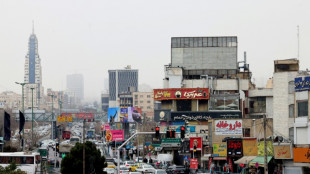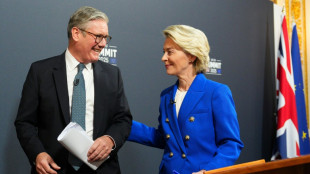-
 Limited internet briefly returns in Iran after protest blackout
Limited internet briefly returns in Iran after protest blackout
-
South Africa declares national disaster as floods batter region

-
 Gang members in Guatemala kill seven police after prison crackdown: minister
Gang members in Guatemala kill seven police after prison crackdown: minister
-
Villa's title bid rocked by Everton loss, Newcastle held at Wolves

-
 Dybala boosts Roma's Champions League hopes, Fiorentina honour Commisso
Dybala boosts Roma's Champions League hopes, Fiorentina honour Commisso
-
Villa's title bid rocked by Everton loss, Newcastle held by Wolves

-
 'Avatar: Fire and Ash' at number one in N.America for fifth straight week
'Avatar: Fire and Ash' at number one in N.America for fifth straight week
-
Limited internet returns in Iran after protest blackout

-
 Syria's leader agrees truce deal with Kurds after govt troops advance
Syria's leader agrees truce deal with Kurds after govt troops advance
-
Smith's penalty sees Quins eliminate La Rochelle, Bordeaux secure top seeding

-
 Atletico edge Alaves to strengthen Liga top-four hold
Atletico edge Alaves to strengthen Liga top-four hold
-
Uganda president says opposition 'terrorists' in victory speech

-
 New Zealand register first ODI series win in India despite Kohli ton
New Zealand register first ODI series win in India despite Kohli ton
-
Elvira wins Dubai Invitational after Lowry's last hole meltdown

-
 Jeong snatches Union late draw at Stuttgart in Bundesliga
Jeong snatches Union late draw at Stuttgart in Bundesliga
-
Man Utd's Martinez hits back at Scholes after height jibes

-
 Frank on the brink as Romero calls for unity amid Spurs 'disaster'
Frank on the brink as Romero calls for unity amid Spurs 'disaster'
-
Chile declares emergency as wildfires kill at least 15

-
 Europe hits back at Trump tariff threat over Greenland
Europe hits back at Trump tariff threat over Greenland
-
Men's Fashion Week in Paris: what to watch

-
 McGrath goes top of slalom standings with Wengen win
McGrath goes top of slalom standings with Wengen win
-
No Venus fairytale as Alcaraz, Sabalenka win Melbourne openers

-
 Iran considers 'gradually' restoring internet after shutdown
Iran considers 'gradually' restoring internet after shutdown
-
Mitchell, Phillips tons guide New Zealand to 337-8 in ODI decider

-
 Flailing Frankfurt sack coach Toppmoeller
Flailing Frankfurt sack coach Toppmoeller
-
Kurdish forces withdraw from Syria's largest oil field as govt forces advance

-
 'Proud' Venus Williams, 45, exits Australian Open after epic battle
'Proud' Venus Williams, 45, exits Australian Open after epic battle
-
Vonn in Olympic form with another World Cup podium in Tarvisio super-G

-
 Alcaraz kicks off career Grand Slam bid with tough Australian Open test
Alcaraz kicks off career Grand Slam bid with tough Australian Open test
-
Hosts Morocco face Mane's Senegal for AFCON glory

-
 Europe scrambles to respond to Trump tariff threat
Europe scrambles to respond to Trump tariff threat
-
Venus Williams, 45, exits Australian Open after epic battle

-
 Taiwan's Lin wins India Open marred by 'dirty' conditions
Taiwan's Lin wins India Open marred by 'dirty' conditions
-
Indonesia rescuers find body from plane crash

-
 Kurdish-led forces withdraw from Syria's largest oil field: monitor
Kurdish-led forces withdraw from Syria's largest oil field: monitor
-
Ball girl collapses in Australian Open heat as players rush to help

-
 France's Moutet booed for underarm match point serve in Melbourne
France's Moutet booed for underarm match point serve in Melbourne
-
Zverev happy with response after wobble in opening Melbourne win

-
 'Bring it on': UK's Labour readies for EU reset fight
'Bring it on': UK's Labour readies for EU reset fight
-
New Zealand's Wollaston wins again to lead Tour Down Under

-
 Zverev wobbles but wins at Australian Open as Alcaraz enters fray
Zverev wobbles but wins at Australian Open as Alcaraz enters fray
-
British qualifier upsets 20th seed Cobolli to make mum proud

-
 Zverev drops set on way to Australian Open second round
Zverev drops set on way to Australian Open second round
-
Indonesian rescuers find debris from missing plane

-
 Wembanyama scores 39 as Spurs overcome Edwards, Wolves in thriller
Wembanyama scores 39 as Spurs overcome Edwards, Wolves in thriller
-
Heartbreak for Allen as Broncos beat Bills in playoff thriller

-
 British qualifier upsets 20th seed Cobolli in Melbourne
British qualifier upsets 20th seed Cobolli in Melbourne
-
Paolini races into round two to kickstart Australian Open

-
 Portugal presidential vote wide open as far-right surge expected
Portugal presidential vote wide open as far-right surge expected
-
Lutz kicks Broncos to overtime thriller as Bills, Allen fall short

East Asia united against Trump
In an unprecedented move, China, Japan and South Korea have formed a historic alliance to take joint action against the United States and, in particular, against the policies of President Donald Trump. This unusual cooperation between the three East Asian countries, which have often been marked by conflict and rivalry throughout their history, marks a turning point in global geopolitics and could have far-reaching implications for the global economy and international relations.
Overcoming historical tensions
Relations between China, Japan and South Korea have often been marked by mistrust and territorial disputes in the past. Historical conflicts in particular, such as Japan's occupation of China in the 1930s and the atrocities associated with it, have left deep scars. There are also ongoing tensions between South Korea and Japan that date back to the period of Japanese colonial rule. Nevertheless, these countries have now decided to put their differences aside and join forces against what they perceive as threatening US policies.
Reaction to Trump's tariff policy
The main reason for this alliance is the aggressive tariff policy of the US under President Trump. Since taking office, Trump has pursued a protectionist trade policy aimed at strengthening the US economy by imposing high tariffs on imports from various countries, particularly China, Japan and South Korea. These tariffs have significantly affected these countries' exports to the US and led to considerable economic losses. In response, the three countries have decided to work more closely together and develop joint strategies to counter the economic pressure from the US.
Historic meetings and agreements
A decisive step in this direction was the meeting of the trade ministers of China, Japan and South Korea in Seoul, which was described as historic. At this meeting, the first of its kind in over five years, the ministers agreed to accelerate negotiations on a trilateral free trade agreement. This agreement is intended to facilitate trade between the three countries and reduce their dependence on the US. In addition, they agreed to work more closely together to strengthen supply chains and promote the digital and green economy.
Political dimension
The alliance also has a strong political dimension. In a joint statement, the three countries emphasised the need for a ‘predictable environment for trade and investment’ and criticised the US's unilateral trade measures as destabilising for the global economy. This statement can be interpreted as a direct message to the US government that the East Asian countries are not prepared to accept the tariffs imposed by Trump without protest.
Possible implications
The implications of this alliance could be far-reaching. On the one hand, it could accelerate economic integration in East Asia and lead to a shift in global trade flows. If China, Japan and South Korea strengthen their trade relations with each other, this could reduce the importance of the US as a trading partner for these countries. On the other hand, the alliance could also have political and security implications. Traditionally, Japan and South Korea are close allies of the US in the region, and closer cooperation with China could call the existing alliance system into question.
Reactions from Washington
This development has caused concern in Washington. The US government fears that the alliance could weaken American influence in East Asia and jeopardise the US's strategic position in the region. In particular, the prospect of a trilateral free trade agreement is seen as a threat to the US economy, as it could make it more difficult for American companies to access the lucrative markets in China, Japan and South Korea.
A new model of cooperation
Despite the challenges this alliance poses, there are also voices that see it as an opportunity for a multipolar world order. Cooperation between China, Japan and South Korea could serve as a model for a new form of regional cooperation based on economic integration and mutual respect rather than hegemonic claims.
Outlook
Overall, the historic alliance between China, Japan and South Korea marks a turning point in global geopolitics. It is a direct response to the protectionist policies of the US under President Trump and could permanently change the balance of power in the world. It remains to be seen how this alliance will develop in the coming years and what impact it will have on the international order.

EU vs. Hungary: Lawsuit over ‘national sovereignty’ law

Ukraine: Zelenskyy appeals for international aid

Lebanon: Is a new wave of refugees coming to the EU?

Terrorist state Iran attacks Israel with missiles

Belarus: ICC investigates dictator Lukashenko

NATO: Ukraine ‘at the top of the list!’

NATO is training to fight cyber attacks

Digital Ocean Twin: Protecting the Oceans

What is the outlook for France’s economy?

How melting Alpine glaciers affect valleys

The EU Commission and its climate targets?




